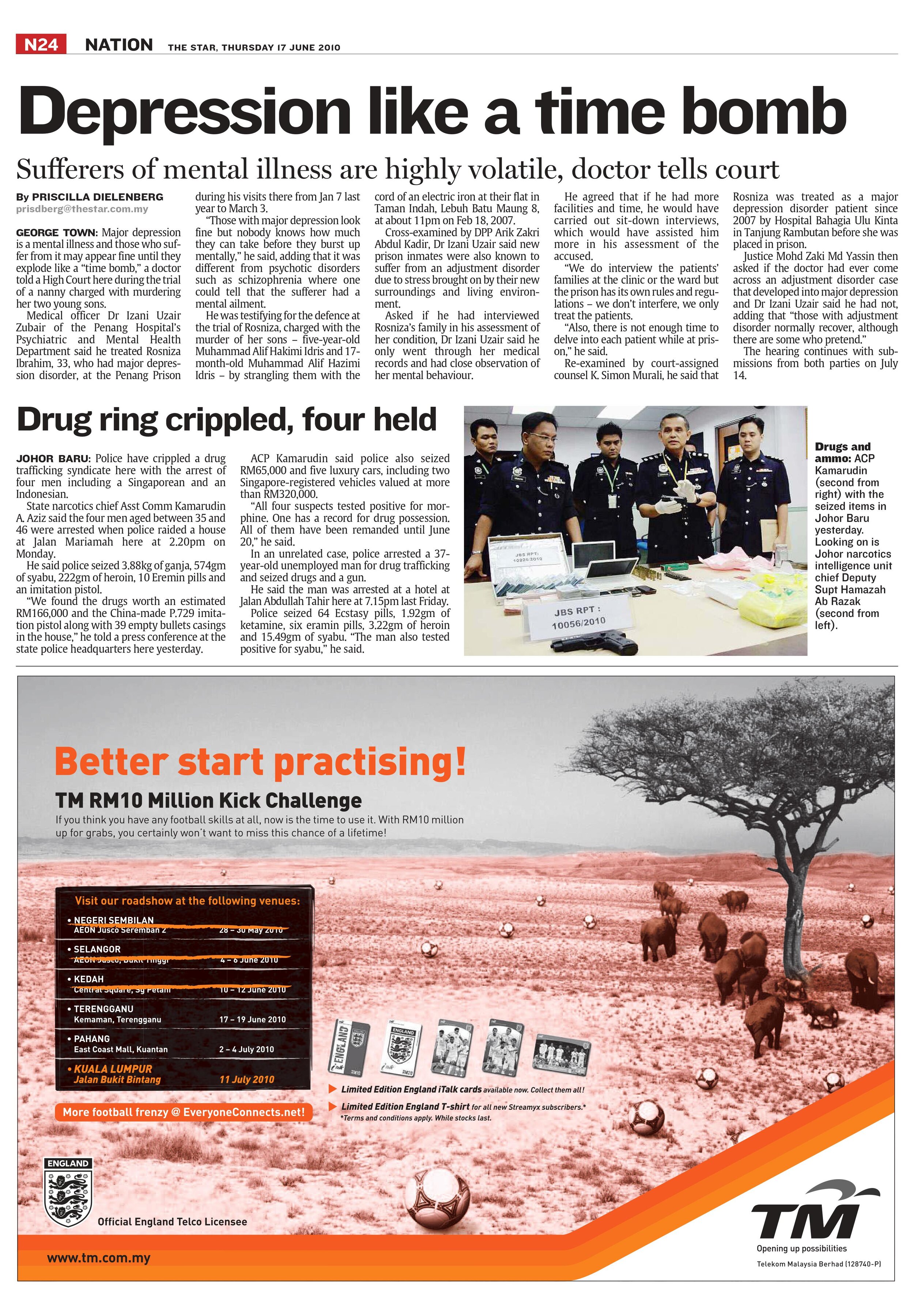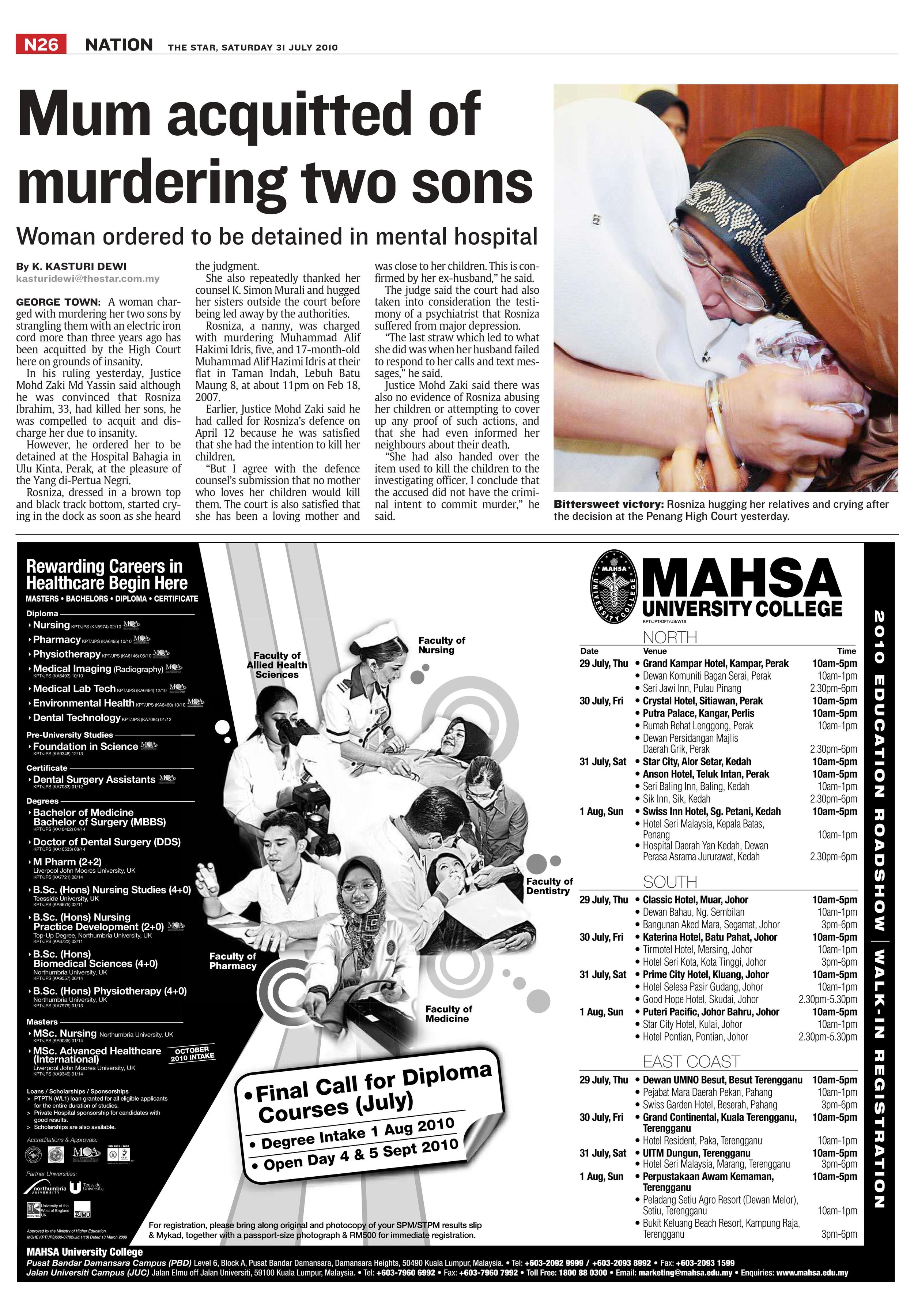
Pendakwa Raya lawan Rosniza binti Ibrahim — the first case that moved me and made me think hard what I was doing. It wasn’t the first infanticide (the would be PR lwn Tan Chin Lee, which Hj Azhar Mokhtar took the lead) but my first double homicide. In my opinion the material before the court was inadequate for a finding that there was insanity in law. The Judge said, a mother would never take the life of her children. After presenting my recommendation to my superior, he reminded me that we have our worldly duties and we only have to perform our duty in accordance with law. No appeal filed. I was younger then and just recently became a father, perhaps only newly acquainted with the truths of life. My opponent was Mr Simon Murali who handled a number of court assigned matters at that time with courtesy and skill. We probably had 3 murder trials together in a memorable year.
I learned a lot about expert evidence in this trial and benefitted from input from experts such as Dato’ Dr Bhupinder Singh the Head of the Forensic Pathology Department of Penang Hospital, seniors at the office and DPPs from other states. I even rang one up just because I read her name in a reported case on similar legal issues. I had also consulted a government psychiatrist beforehand as well. It is impossible to know everything and we need to do the needful to prepare ourselves for the task at hand. Good thing that being a DPP it seemed easier to contact government departments for information or advice. This insight informed me that all the more reason for the court to issue subpoena duces tecum in criminal cases (or orders under Section 51 of the CPC) when requested by defence counsel — because private lawyers defending accused persons do not benefit from such access to information. In 2021 there was at least one sessions court that declined my application to issue such summons, without giving reasons in writing. Experts are professional, they have their integrity and the scientific basis for their findings, so there should be no issue of being unduly influenced by the lawyer defending an accused person. Perhaps a review mechanism (within our OSA and related law, and of course attended by a DPP/SFC as respondent) can be enacted to enable the High Court to scrutinise whether certain information from the government agencies can be released to the court for a specific purpose for a specific case, to enable the accused to establish his defence. We are mindful of course that there is no real “discovery” in criminal case as understood under civil procedure. I believe there could be convictions and executions out there that came about because the accused just could not set up his defence convincingly because he had no access to information, or he had no (meaningful) way to show the court that information was kept away from it.
Cases like these shaped my assumptions on the connection between sociological and economic factors with the incidence, reporting, and success rate for investigations of crime. I was privileged and lucky to be surrounded by experienced professionals and some of the leading experts in the country who worked together to establish justice in accordance with law. We were not out to get conviction at all costs— hence what we did was in accordance with law. Any doubt should be resolved in favour of the Accused.
It is said that the first rule in cross examination is not to cross examine, and the second is “Do not ask questions in cross examination unless you already know the answer”. I was also involved at the early stages of Tan Chin Lee, another homicide where the boyfriend of a woman stomped her 2 year old son to death — I remember the boy’s name “KWH”, I believe and pray he is in a better place than this sometimes cruel world. This terrible attack was witnessed by his 8 year old sister through the hole in the door where the doorknob was meant to be (if I recall the facts correctly).
We know that the story that emerges in court is often an approximation at best, distilled from drafted and redrafted police documents, rehearsed testimonies, prepared witnesses and the imagination of the finder of fact. At the end of the day, prosecuting and defence counsel have a job to do and to do it well, and then go home. The human and environmental infirmities concerned with the detection, investigation and trial of crimes are so patent that the evidence presented in court through witnesses on oath are at best impressions simulating truth. Documents such as laporan polis and laporan kimia are instruments deployed to create precision in a narration which are often impossible to construct. I believe commercial crime cases are probably more likely to be reconstructed fairly, but even they involve interpretation of human expectation, especially in cases involving deception. Over the centuries of common law, I believe the public needed a semblance of truth in the criminal justice system with due process and the right mechanisms in place to ensure there is public trust in the system. Not based on any expectation that these mechanisms can actually prevent wrong convictions or wrong acquittals.





